Austrian actor Albert Rueprecht (1929) was a member of the Burgtheater and Theater in der Josefstadt in Vienna. The blond actor made over 40 feature films, including many Heimatfilms in which he often played the handsome jeune premier.
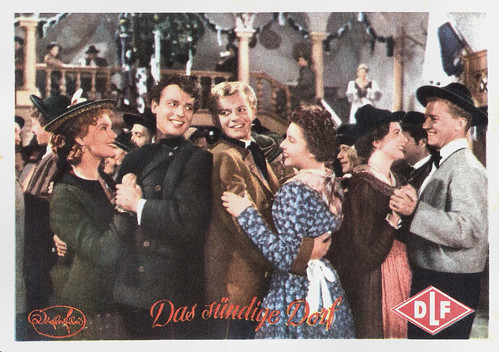
West-German postcard by DLF. Photo: Dörfler-Filmproduktion. Publicity still for Das sündige Dorf/The Village of Sin (Ferdinand Dörfler, 1954) with Renate Mannheim, Thomas Reyer, Albert Rueprecht and Hanna Hutten.
Albert Rueprecht was born in 1929 in Vienna, the capital of Austria. He had his first stage experiences at the Akademischen Gymnasium when he played in Ferdinand Raimund’s Alpenkönig und Menschenfeind (King of the Alps and Enemy of the People).
From 1949 to 1951, he took acting classes with Zdenko Kestranek, Helmuth Krauss and Edward Wolters, teachers of the Max Reinhardt Seminar in Vienna. He had his first engagements as an actor at the Theater der Courage and the Theater am Parkring.
At the Wiener Volkstheater he played in 1953 Ferdinand in Kabale und Liebe (Intrigue and Love) by Friedrich Schiller. After appearances at Theater in der Josefstadt, he came in 1954 to the prestigious Burgtheater.
There he played among others Romeo in Romeo and Juliet, Don Juan in Dame Kobold by Calderón de la Barca and Gottfried in Das Käthchen von Heilbronn (Cathy of Heilbronn) by Heinrich von Kleist.
In 1955 he was in the cast of the historic production with which the Burgtheater re-opened: König Ottokars Glück und Ende (King Ottokar's Fortune and End) on the stage. For almost ten years he remained at the Burgtheater. From 1958 to 2004 he was an ensemble member at the Theater in der Josefstadt. There he played a total of over 80 roles.
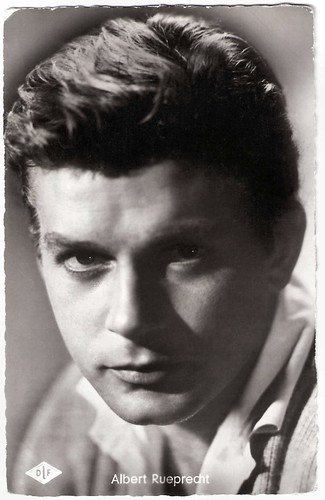
German postcard by Kolibri-Verlag, Minden/Westf., no. 2102. Photo: H.P. / Deutsche London / Schwennecke. Publicity still for Wo der Wildbach rauscht/Where the Wildbach rushes (Heinz Paul, 1956).
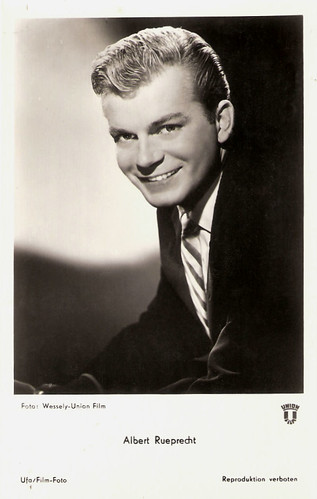
German postcard by Ufa, no. 6309/2. Photo: Wessely / Union-Film.
In 1954, Albert Rueprecht had a part in Echo der Berge/Echo of the mountains (Alfons Stummer, 1954), an Austrian classic of the Heimatfilm genre and one the most popular German language films ever.
He would play in many Heimatfilms of the 1950s, including Die Wirtin zur Goldenen Krone/The Innkeeper of the Golden Crown (Theo Lingen, 1955), Dort wo die Alpen glühen/Where the Alpine glow (Otto Meyer, 1956), and Im Prater blüh’n wieder die Bäume/Trees Are Blooming in Vienna (Hans Wolff, 1958) with Johanna Matz.
Often he was the good-looking jeune premier, which made him quite popular. His roles ranged from a young officer to a peasant in love, from the ‘elegant man of the world’ to the emperor.
In the last part of the Sissi trilogy, Sissi – Schicksalsjahre einer Kaiserin/Sissi - Fateful Years of an Empress (Ernst Marischka, 1957), he played the Archduke Ferdinand Max opposite Romy Schneider.
In total, Rueprecht made over 50 feature films, including the melodrama Das Licht der Liebe/The light of love (Robert Adolf Stemmle, 1954) with Paula Wessely as his mother, and Der Vogelhändler/The Bird Seller (Géza von Cziffra, 1962) with Conny Froboess.
After the end of the Heimatfilm wave, Rueprecht only got small roles including a few parts in international productions, such as Song Without End (Charles Walters, 1960) starring Dirk Bogarde. He participated in TV series and intensified his theatrical work, especially at the Theater in der Josefstadt.
In 2008 he played at the Mörbischer Seefestspiele the Emperor Franz Joseph in the operetta Im weißen Rößl (The White Horse Inn). His later films include Duett zu dritt/Tea for Three (Gerhard Janda, 1976) with Iris Berben, The Fifth Musketeer (Ken Annakin, 1979) and Ein Herz wird wieder jung/A heart becomes young again (Heide Pils, 1999).
Albert Rueprecht was married with the actresses Ellen Umlauf and Ann Millar (Elisabeth Rueprecht, born Millar) who died in 2010. His son is Alexander Rueprecht, from his marriage with Ellen Umlauf.
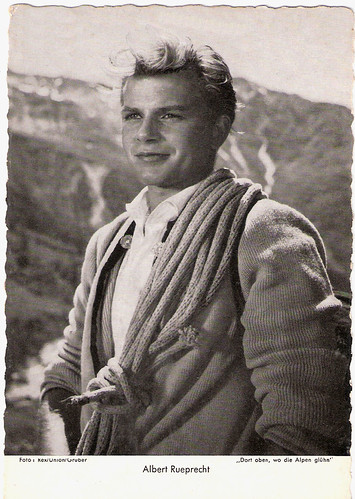
German postcard by WS-Druck, Wanne-Eickel, no. 144. Photo: Rex / Union / Gruber. Publicity still for Dort oben, wo die Alpen glühen/Up there where the Alps glow (Otto Meyer, 1956).
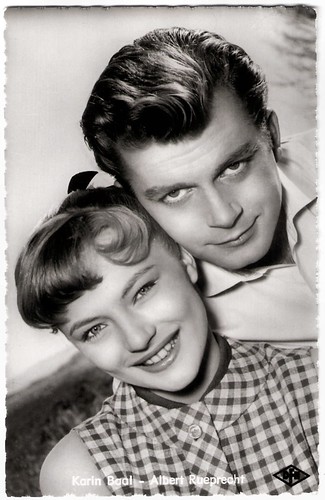
German postcard by Kolibri-Verlag, Minden/Westf., no. 2507. Photo: DFH / Lilo. Publicity still for Der müde Theodor/Tired Theodore (Géza von Cziffra, 1957) with Karin Baal.
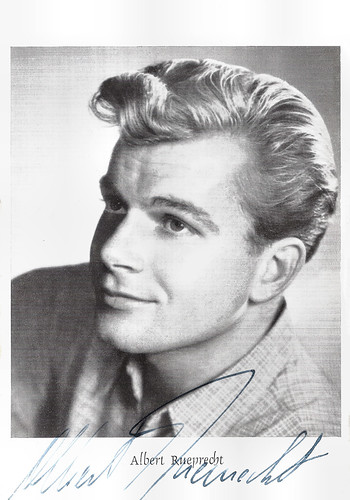
Vintage autograph card.
Sources: Wikipedia (German) and IMDb.

West-German postcard by DLF. Photo: Dörfler-Filmproduktion. Publicity still for Das sündige Dorf/The Village of Sin (Ferdinand Dörfler, 1954) with Renate Mannheim, Thomas Reyer, Albert Rueprecht and Hanna Hutten.
Romeo
Albert Rueprecht was born in 1929 in Vienna, the capital of Austria. He had his first stage experiences at the Akademischen Gymnasium when he played in Ferdinand Raimund’s Alpenkönig und Menschenfeind (King of the Alps and Enemy of the People).
From 1949 to 1951, he took acting classes with Zdenko Kestranek, Helmuth Krauss and Edward Wolters, teachers of the Max Reinhardt Seminar in Vienna. He had his first engagements as an actor at the Theater der Courage and the Theater am Parkring.
At the Wiener Volkstheater he played in 1953 Ferdinand in Kabale und Liebe (Intrigue and Love) by Friedrich Schiller. After appearances at Theater in der Josefstadt, he came in 1954 to the prestigious Burgtheater.
There he played among others Romeo in Romeo and Juliet, Don Juan in Dame Kobold by Calderón de la Barca and Gottfried in Das Käthchen von Heilbronn (Cathy of Heilbronn) by Heinrich von Kleist.
In 1955 he was in the cast of the historic production with which the Burgtheater re-opened: König Ottokars Glück und Ende (King Ottokar's Fortune and End) on the stage. For almost ten years he remained at the Burgtheater. From 1958 to 2004 he was an ensemble member at the Theater in der Josefstadt. There he played a total of over 80 roles.

German postcard by Kolibri-Verlag, Minden/Westf., no. 2102. Photo: H.P. / Deutsche London / Schwennecke. Publicity still for Wo der Wildbach rauscht/Where the Wildbach rushes (Heinz Paul, 1956).

German postcard by Ufa, no. 6309/2. Photo: Wessely / Union-Film.
A Classic of the Heimatfilm
In 1954, Albert Rueprecht had a part in Echo der Berge/Echo of the mountains (Alfons Stummer, 1954), an Austrian classic of the Heimatfilm genre and one the most popular German language films ever.
He would play in many Heimatfilms of the 1950s, including Die Wirtin zur Goldenen Krone/The Innkeeper of the Golden Crown (Theo Lingen, 1955), Dort wo die Alpen glühen/Where the Alpine glow (Otto Meyer, 1956), and Im Prater blüh’n wieder die Bäume/Trees Are Blooming in Vienna (Hans Wolff, 1958) with Johanna Matz.
Often he was the good-looking jeune premier, which made him quite popular. His roles ranged from a young officer to a peasant in love, from the ‘elegant man of the world’ to the emperor.
In the last part of the Sissi trilogy, Sissi – Schicksalsjahre einer Kaiserin/Sissi - Fateful Years of an Empress (Ernst Marischka, 1957), he played the Archduke Ferdinand Max opposite Romy Schneider.
In total, Rueprecht made over 50 feature films, including the melodrama Das Licht der Liebe/The light of love (Robert Adolf Stemmle, 1954) with Paula Wessely as his mother, and Der Vogelhändler/The Bird Seller (Géza von Cziffra, 1962) with Conny Froboess.
After the end of the Heimatfilm wave, Rueprecht only got small roles including a few parts in international productions, such as Song Without End (Charles Walters, 1960) starring Dirk Bogarde. He participated in TV series and intensified his theatrical work, especially at the Theater in der Josefstadt.
In 2008 he played at the Mörbischer Seefestspiele the Emperor Franz Joseph in the operetta Im weißen Rößl (The White Horse Inn). His later films include Duett zu dritt/Tea for Three (Gerhard Janda, 1976) with Iris Berben, The Fifth Musketeer (Ken Annakin, 1979) and Ein Herz wird wieder jung/A heart becomes young again (Heide Pils, 1999).
Albert Rueprecht was married with the actresses Ellen Umlauf and Ann Millar (Elisabeth Rueprecht, born Millar) who died in 2010. His son is Alexander Rueprecht, from his marriage with Ellen Umlauf.

German postcard by WS-Druck, Wanne-Eickel, no. 144. Photo: Rex / Union / Gruber. Publicity still for Dort oben, wo die Alpen glühen/Up there where the Alps glow (Otto Meyer, 1956).

German postcard by Kolibri-Verlag, Minden/Westf., no. 2507. Photo: DFH / Lilo. Publicity still for Der müde Theodor/Tired Theodore (Géza von Cziffra, 1957) with Karin Baal.

Vintage autograph card.
Sources: Wikipedia (German) and IMDb.
No comments:
Post a Comment